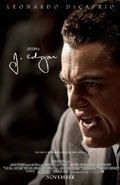
Directed by
Clint Eastwood
135 minutes
Rated M
Reviewed by
Benard Hemingway

J. Edgar
Synopsis: The life story of J. Edgar Hoover, the first Director of the Federal Bureau of Investigation.With a meticulous production design and a wonderful performance from the extraordinary Leonardo DiCaprio, there are two good reasons to see J. Edgar. But there are also two good reasons not to see it. One is that, at least according to Eastwood and his screenwriter, Dustin Lance Black, the famous (or infamous) FBI boss was a dull and dourly repressed little man. The other is that their film about him is if not exactly dull, then a dourly repressed affair. Matching form and content is rightly regarded as a good thing but doing so is questionable when the content is so thoroughly humourless and monotonously obsessional (we assume, of course, that their portrait is historically justified, not a tendentious fabrication) and Eastwood and Black, the latter who scripted Milk (2009) a biopic about gay rights activist Harvey Milk, fail to find a way out of this dilemma.
They open the film with Hoover at the end of his career, dictating his life story to an FBI agent seconded to be his amanuensis (at least this is what I think is going on as this character changes twice during the course of the film). This gives them the structural justification to use the voice-over as an expositional device framing the events depicted but it is a strategy which has its pitfalls. Firstly, it reveals the film’s ultimate destination, the sad and isolated Hoover, in one fell swoop. Secondly, and even more so because Hoover is a classic “unreliable” witness, it confines the organic flow of depicted events to a single dramatically flat point of view.
To get around these limitations the film jumps in and out of chronological time and shows us things which lie outside Hoover’s perspective. But particularly in the film’s latter stages this is more confusing than anything else, although by the 2 hour mark perhaps this is also due to a fading attention span. Not that they didn’t have the opportunity to spice things up. Their Hoover (he would be rolling in his grave if he could see how he has been portrayed) is a closet homosexual with cross-dressing tendencies and a fixation with tailoring, a fussy neurotic whose life was irretrievably warped by his zealously religious mother (Judi Dench). He is also a martinet without a glimmer of self-awareness. There is one brief scene when he is being interviewed for his first important post that gets some leverage out of this but by and large the film which is photographed in studiously retrained tones is as stiffly mono-dimensional as the man himself.
This lack of dynamic is most oddly apparent in the relationship between Hoover and a stenographer, Helen Gandy (Naomi Watts), who would become his life-long secretary. Whilst initially she appears to be the door by which we will access Hoover’s heart and mind she is summarily disposed of early in the piece and does nothing thereafter but his filing. Why Watts is anyone guess. One can’t help but wonder if there were whole scenes left on the cutting room floor. More time is given to his relationship with his close companion, FBI deputy director Clyde Tolson (Armie Hammer) but even here there is no real insight into the man. A kitchen scene at the film’s end when both are on their last legs feels rather tokenistic. Perhaps the problem is that Hoover was not a man of any depth or contradiction. It happens I’m sure but if as a film-maker you’re going to be true to that you’ve got your work cut out in the entertainment stakes.
Being true certainly is a constant value in Eastwood’s film-making, and he well captures the slip between Hoover's cup and lip, but, Will Munney-like, there is also a characteristically grim determination to his mission which in this case seems to have compounded the problems inherent in his subject matter (and/or vice versa). The careful period detail (inexplicably undermined by the “old person” make-up which particularly with Armie Hammer is awful) and DiCaprio’s flawless performance are not enough to overcome the feeling that J Edgar is a diligent history lesson that would have benefited greatly from a few colour slides and a shorter running time.

Want more about this film?


Want something different?




